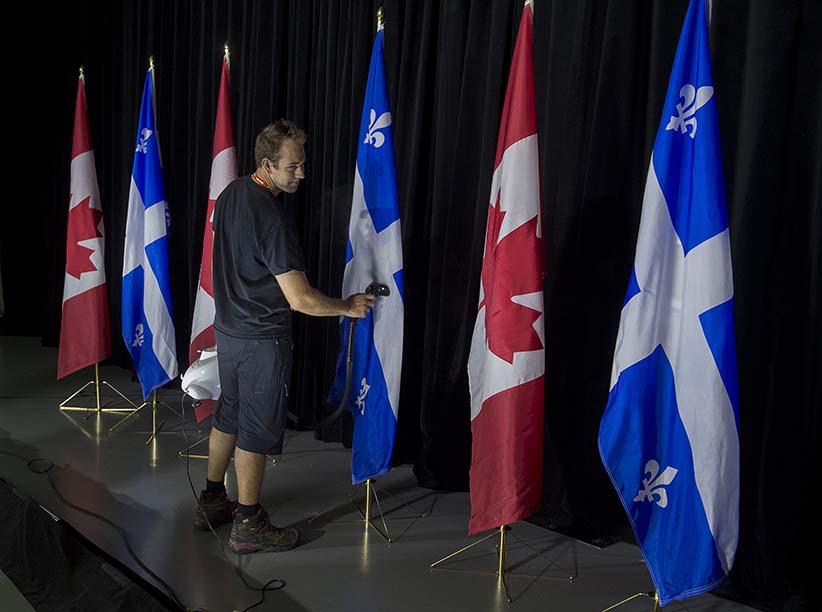Quebec’s unprecedented battle royale
An unexpected four-way race has broken out. Even the once-dead Bloc has emerged as a potential kingmaker.
Share

At the outset of the election campaign over two months ago, the province of Quebec was an NDP orange canvas with splashes of Conservative blue and Liberal red. Stephen Harper’s Conservatives were relegated to their scattered support in and around the Quebec City area, and Liberals to their few pockets in Montreal. The rest of the province was a beachhead for, if national polls were to be believed, Prime Minister Tom Mulcair’s march to victory on Oct. 19. The once-mighty Bloc was a spoiler at best and an afterthought at worst.
In one sense, not much has changed, in that the NDP will likely still hold the majority of the province’s 78 seats come Oct. 20. For this, the party can thank its rather massive support amongst Quebec’s francophone majority, which defected from the Bloc Québécois to Jack Layton’s NDP in the 2011 election and remained, in a diminished capacity, with Tom Mulcair’s iteration of the party.
An analysis of voting intentions amongst francophone Quebecers by Vox Pop Labs suggests the NDP still has about a 10-point lead amongst those speaking the language of René Lévesque. But it’s a closer race than before, with the Liberals benefiting most from NDP troubles in the province. According to the Vox Pop Labs analysis, Justin Trudeau’s party has edged slightly past the Bloc as the second francophone choice.
Even a small shift of the all-important francophone vote away from the NDP has had implications for the party, the province and the country. What started off as a romp for the NDP has turned into a race between four parties in many areas of the province, with the Liberals stronger than predicted and the Bloc Québécois catapulting from dead-man-walking status to potential kingmaker in a minority government. The likely result: Quebec will be less canvas than multicoloured quilt.
[widgets_on_pages id=”Election”]
“For decades, Quebecers have mostly voted en masse for one party. First it was the Liberals under Pierre Trudeau, then the Progressive Conservatives under Brian Mulroney, then the Bloc Québécois,” says political analyst Jean Lapierre. “This time, I don’t think Quebecers will put all their eggs in one basket.”
Despite its lead, the NDP is the net loser in this scenario; their path to 24 Sussex relies heavily on Quebec. Even a loss of 10 of its 59 seats in the province seriously undermines its ability to form a government—particularly if, as seems to be the case, the NDP continue to face strong headwinds in Ontario and British Columbia.
On the ground, this means a series of two- and three-way races in ridings that were solidly NDP mere weeks ago. In broad strokes, the island of Montreal is divided along linguistic lines of yore, with close races between the NDP and the Liberals in the western part of the island and between the NDP and the Bloc in the east. The northern and southern suburbs flanking the city are a jumble of races between the NDP and Liberals in some cases, and the NDP and the Bloc in others. To the west, it is a race between the Liberals and the Conservatives. In the Quebec City region, meanwhile, it is mostly the NDP and the Conservatives that are at each other’s throats.
“Les regions”—the largely rural areas outside of Quebec’s bigger cities—“will be far more fragmented than in the past, with the ones farther away tipping to the Bloc and those closer to the cities going NDP,” Lapierre says.
What’s behind the Bloc’s sudden viability? Don’t call it a comeback.The separatist party won’t likely score any better than the 25 per cent support it received in 2011, giving it just a handful of seats around the province. Yet even this is a marked improvement from two months ago, when various polls projected the party would be relegated to just one seat. “The Bloc benefited from the Liberal rise, which took away some support from the NDP,” says Lapierre. “Also, [Bloc Leader] Gilles Duceppe’s return to the party gave it a boost.”
The Bloc spin has the party playing a crucial role in a minority Parliament. It’s not totally inconceivable: imagine, as the Bloc war room has feverishly done over the last few weeks, a scenario in which the Conservatives win 168 of the country’s 338 ridings, with the Liberals and the NDP taking a combined 167. The Bloc would have the balance of power in Parliament with just three seats.
Of course, this is contingent on Duceppe winning his own riding and at least two other seats, which, like most things in this campaign, is hardly a given.